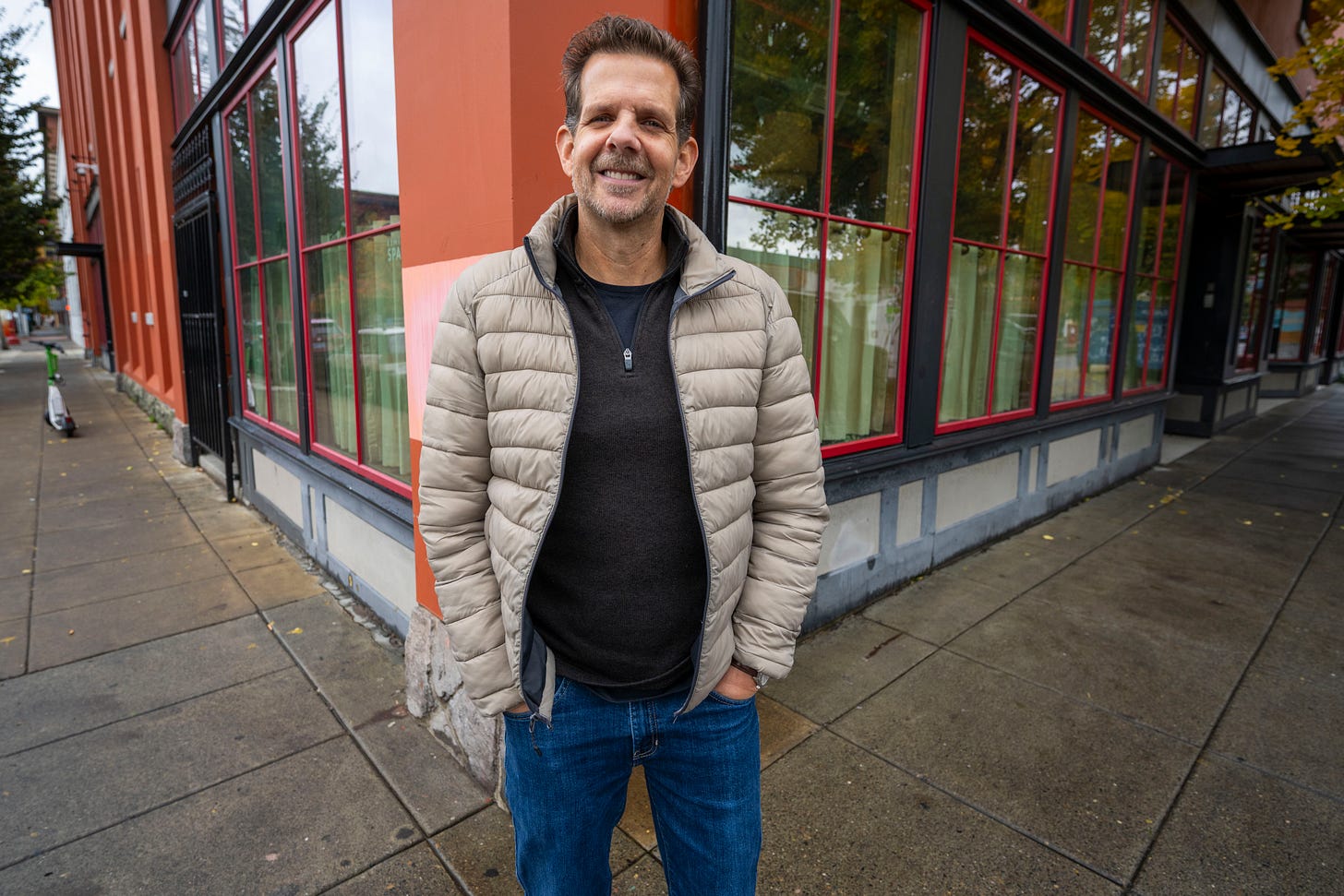Housing First advocates reconsider strategy
Some proponents acknowledge the policy's lack of success

Housing First—providing immediate permanent housing without prerequisites like sobriety or treatment—has endured locally as sacred doctrine without need to measure its effectiveness or side effects.
Now some of Housing First’s main proponents acknowledge that it hasn’t worked.
A turning point came in September, when Andy Mendenhall, executive director of the city’s largest social service agency, Central City Concern, shared his research with heads of several smaller, “old school” agencies—the kind that emphasize personal recovery. Mendenhall invited the executive directors of Union Gospel Mission (Matt Stein), Portland Rescue Mission (Erin Holcomb), Blanchet House (Scott Kerman) and CityTeams (Lance Orton) to lunch at Xin Ding Dumpling House in Old Town to hear him out face-to-face.
Mendenhall shared the findings of a 27-page white paper, “Exploring a New Approach to Housing,” that he co-authored and had released on Sept. 10. The paper acknowledges that Housing First has not met its goal of moving homeless people into independent living, while introducing unsustainable burdens on the housing agencies attempting to practice it as well as on the wider community.
Mendenhall called it “a model which cannot continue within this region.”

Orton, a former homeless addict who now runs the nonprofit that helped him get back on his feet, called it “a 180-degree flip for Central City Concern.”
“We were all delighted to see the largest housing provider in the state finally listening to what we have all been saying for many, many years,” Orton told the NW Examiner later.
Orton followed up on the white paper by releasing his own, more conversational analysis:
“Far too often … people are placed into apartments or supportive housing units while still deep in addiction or untreated mental illness. When that happens, they are not being set up to succeed. They are being set up for relapse, eviction and another turn back to the streets. It is heartbreaking for them, devastating for neighbors and unsustainable for the housing providers who carry the cost of repeated churn. If we truly want stability that lasts, housing must come hand-in-hand with recovery.”
No persuasion was needed for Orton to pile on the indictment of Housing First, but the white paper even got through to HereTogether, a coalition built to pass and monitor the 2020 Metro Supportive Housing Measure, which is pumping $250 million per year primarily into permanent housing. Social support to the homeless and formerly homeless is included, but many sources say that element has been an afterthought.
A month after Central City Concern hit the brakes, HereTogether also revealed a turnabout.
“To be successful, Housing First depends on strong wraparound support, addiction services, case management and mental health care,” read an Oct. 7 statement Heretogether.
“Too often these programs lack the necessary resources to implement Housing First as intended. At the same time, fentanyl has transformed addiction into something faster-moving and deadlier than what service providers faced even a decade ago. So how do we adapt our thinking to the reality we are facing?
“These realities don’t invalidate Housing First,” HereTogether concluded, “but they should push us to keep questioning assumptions and improve our approach.”

Just as significant, the statement cited a New York Times opinion piece, “Forced drug treatment isn’t horrific. It’s a relief,” by psychologist Keith Humphreys, the senior drug policy adviser in the Obama administration.
Housing First, like a similar approach to addiction called “harm reduction,” puts individual freedom paramount and makes changes in behavior merely options offered to sufferers.
“Critics of mandated treatment who assert that intervention undermines an individual’s autonomy forget that addiction itself saps that autonomy,” Humphreys wrote. “Mandatory treatment that gives people their good judgment back is a restoration of their autonomy, not a violation of it.”
While a new perspective is emerging locally, President Donald Trump’s executive order in July lit another fire by threatening to end federal funding for Housing First and harm reduction programs.
Was Trump’s order the real reason local agencies saw the light?
Mendenhall’s research says the Housing First model failed of its own merit and must be transformed whatever the level and resources or funding. Property insurance on Central City Concern’s apartment buildings has multiplied sixfold in the past six years due to $1.4 million in loss claims, most of them caused by “behavioral health events,” the white paper found.
Orton accepts that as the main reason the agency came around.
The evidence was piling up under Mendenhall’s eyes.
Staff turnover among “client-facing” workers surpasses 50% annually due to a declines in safety, understaffing and worker burnout, he found.
“CCC staff report deep emotional burden ‘watching people get more ill’ and feeling helpless to get clients the psychiatric services they need to prevent eviction,” the paper continued.
Central City Concern, with more than 2,300 affordable housing units, is not the only affordable housing provider buckling under such circumstances. The paper estimated a total of “6,000 units of affordable housing at risk of foreclosure or losing money in the metro area.”
It doesn’t take an accountant to see the cliff. Orton said that Central City Concern has 190 vacant apartment units in the downtown area due to physical damage and a shortage of suitable tenants.
The agency would not confirm or deny that number or explanation for vacancies.
“They can’t keep anyone in their units,” said Orton, referring to misbehavior that drives other tenants to move out.
Partnership for Progress, an advocacy organization led by three former City Council candidates, Vadim Mozyrsky, Eli Arnold and Bob Weinstein, published Orton’s statement.
“We have a drug addiction problem, not a housing problem,” said Mozyrsky, who has run unsuccessful recent campaigns for the city and county councils.
He is cynical toward those running what some call the “homeless-industrial complex.”
As for the failure of Housing First, “Mendenhall must have known this two or three years ago,” Mozyrsky said. “Now, all of a sudden, they change their tune and realize treatment is the highest priority?”
He believes the housing and social service providers only went along due to the county’s financial leverage.
“To get the money, they had to drink the Kool-Aid and say Housing First was the way to go,” Mozyrsky said.
Sharon Meieran, who could not get traction on this issue during her two terms on the Multnomah County Board, told the Examiner that “Housing First is finally being exposed as a failure. A lot of folks have felt this for a very long time.”
Although the model might have worked if teamed with robust treatment, she said, that has never been the case locally. Still, few buck the system because the funding process demanded it.
“You can’t speak out against Housing First or they will vilify you and cut your funding,” she said.
Agency heads who “couldn’t be seen as agreeing” with Trump’s executive order can now defer on behalf of protecting their revenue stream.
“It provides cover for a lot of organizations that knew it hadn’t worked but couldn’t say anything,” Meieran said. “People are secretly thanking heaven they’re off the hook.”
Private sector Housing First experiment comes to same end
In 1992, Rob Justus founded JOIN, a nonprofit creating permanent housing for the homeless.
Frustrated with the inefficiencies and government requirements involved with funding affordable housing, he cofounded Home First Development in 2009, fulfilling his pledge to produce low-rent housing without public subsidy. As the name of his private venture suggests, he still believed in getting people a roof over their heads was the highest priority.
Home First has built about 1,500 low-rent apartment units, but the process of getting vouchers and social services for low-income households “was a disaster,” said Justus, who recently retired from the business.
Multnomah County controlled the assignment of rental vouchers, taking the screening of prospective tenants out of the landlord’s hands, he said. Tenants he accepted directly could not get the supportive services they needed, and those the county referred to him were chosen without regard to their readiness to live on their own.
“The core of the problem goes back to Multnomah County,” he said.
Whether called Housing First or Home First, having a home may not be enough to end homelessness.



How is this power heirarchy allowed? Anyone with the minimum of common sense knows that if you can't maintain you personal wellfare, it DOESN'T matter WHERE you live! For the love of god! What does it take for PDX / Mult Co to get a move on and deal with this b.s. in a realistic way? This ridiculousness isn't just about the addicts shoe horned into apartments - it's the NEIGHBORS who have to put with the b.s. God. What imbiciles.
Rich’s comments are spot on. But think of the hundreds of millions wasted by feckless Multnomah County government leaders who refused to listen to Sharon’s sage counsel. And think of the lives lost because the County would not follow the example of Bybee Lakes and other organizations who maintained that the Housing First approach was not a successful model.